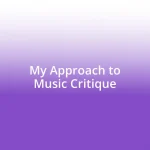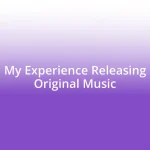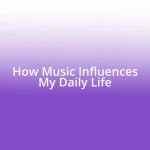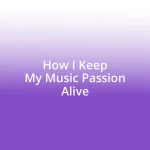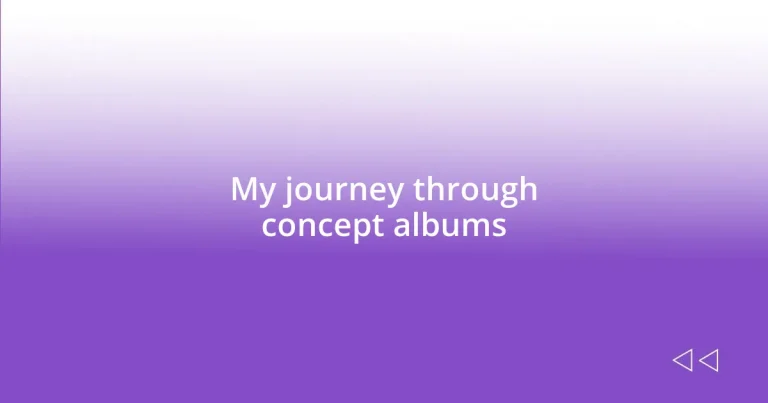Key takeaways:
- Concept albums are cohesive collections of songs that revolve around a central theme, creating an immersive narrative experience.
- Notable concept albums, like Pink Floyd’s “The Wall” and Kendrick Lamar’s “good kid, m.A.A.d city,” reflect complex themes and societal issues, resonating deeply with listeners.
- When creating a concept album, focus on a unifying theme, track arrangement for cohesiveness, and vulnerability in storytelling to connect with your audience.
- To fully enjoy concept albums, immerse yourself in the narrative, treat the album as a complete work, and reflect on your personal emotions during the listening experience.
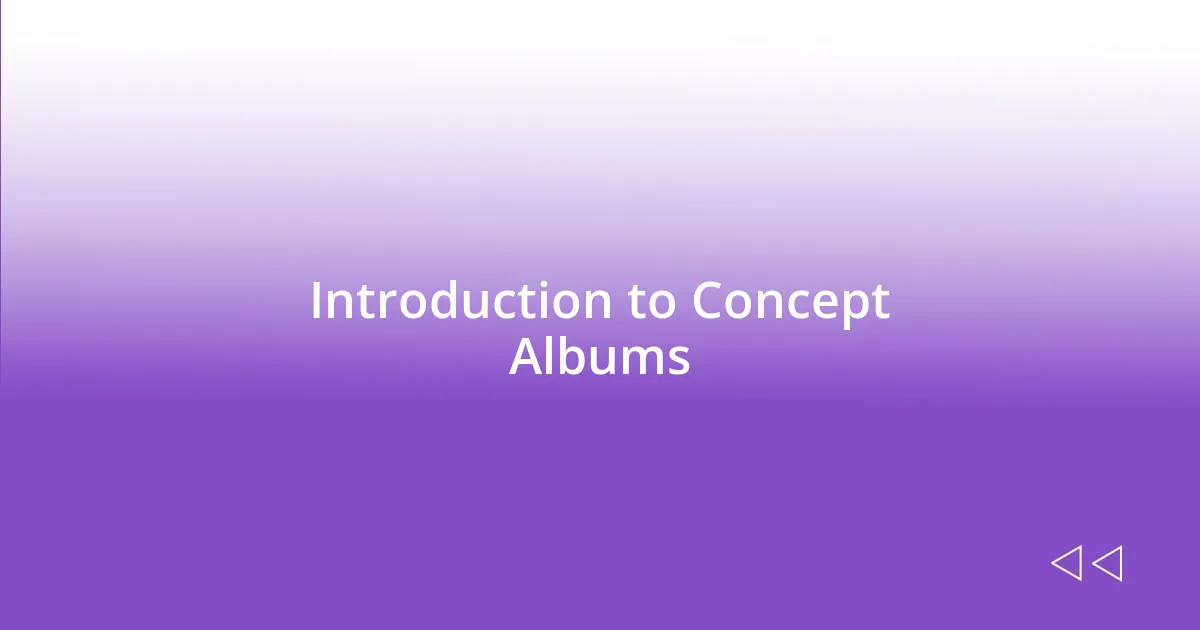
Introduction to Concept Albums
When I first stumbled upon the concept album format, I felt like I had discovered a hidden treasure. Concept albums are a cohesive collection of songs that revolve around a central theme or story, creating an immersive listening experience. I remember being captivated by Pink Floyd’s “The Wall,” where each track unfolded a narrative that resonated deeply with my own feelings of alienation and struggle.
As I explored various concept albums, I couldn’t help but wonder what drives artists to weave intricate tales through their music. It’s fascinating how some albums are like novels, inviting listeners to journey through complex characters and plotlines, much like a favorite book. The emotional depth these albums can evoke often struck me; for instance, the way Frank Ocean’s “Blonde” explores identity left me in introspection about my own experiences.
These albums don’t just string melodies together; they create worlds that we can step into and live within, at least for a little while. Each song becomes a chapter, building the narrative and connecting with listeners in profoundly personal ways. Have you ever found yourself pondering your own life story while listening to a concept album? That’s the unique magic they carry—a blend of storytelling and sound that transcends mere entertainment.
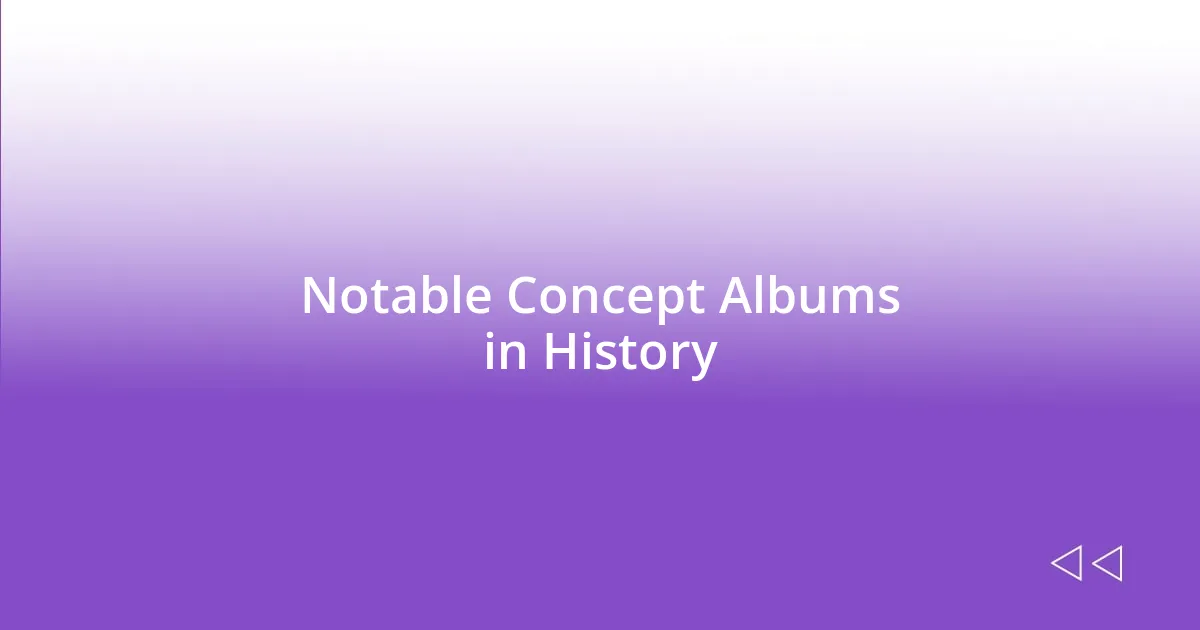
Notable Concept Albums in History
Some of the most notable concept albums in history have left an indelible mark on the music landscape. For instance, David Bowie’s “The Rise and Fall of Ziggy Stardust and the Spiders from Mars” not only showcased Bowie’s artistic genius but also introduced us to the androgynous rock star Ziggy, intertwined with themes of fame and identity. I remember how listening to it felt like stepping into a theatrical performance, shaping my perception of artistry itself.
Another album that truly captivated my spirit was The Who’s “Tommy.” It’s a rock opera that tells the story of a deaf, dumb, and blind boy who becomes a pinball champion. I found it mesmerizing how each song contributes to the storyline, painting a vivid picture that plays out like a film in my mind. The emotional rollercoaster I experienced while diving into Tommy’s world made me appreciate the depths of human experience and the power of music to convey such complex narratives.
In the 21st century, we’ve seen the genre evolve with albums like Kendrick Lamar’s “good kid, m.A.A.d city,” which narrates his life in Compton, addressing themes like racial identity and systemic oppression. I was taken aback by the raw honesty and the compelling storytelling that compelled me to reflect on societal issues that are often overlooked. This album shows that concept albums are not just relics of the past but are alive and well, continuing to inspire and stimulate thought in ways that resonate deeply with today’s audiences.
| Album | Artist |
|---|---|
| The Wall | Pink Floyd |
| Ziggy Stardust | David Bowie |
| Tommy | The Who |
| good kid, m.A.A.d city | Kendrick Lamar |

Analyzing Themes in Concept Albums
Diving deep into the themes of concept albums really opens up new perspectives. Each album often weaves universal concepts—identity, isolation, love—into its narrative, creating a tapestry that many listeners find relatable. For me, listening to The Smashing Pumpkins’ “Melon Collie and the Infinite Sadness” felt like wandering through a labyrinth of emotions, encompassing everything from melancholy to hope. I could sense the struggle and triumph within each song, making it an unforgettable experience.
- Concept albums provide a structured exploration of complex themes.
- They often reflect social issues, like the struggles in Kendrick Lamar’s work.
- The narratives can evoke strong personal connections, resonating with listeners’ experiences.
- Each track acts as a piece of a larger puzzle, illustrating a broader message.
- The emotional journey can be as profound as reading a heartfelt novel.
It’s striking how some albums explore stark contrasts within their narratives. Take “The Rise and Fall of Ziggy Stardust” as an example; it juggles the bright lights of fame against the dark shadows of identity crisis. I remember feeling that exhilarating rush and unsettling dread simultaneously. It’s a reminder that music isn’t just sound; it’s a reflection of our lives and struggles, encouraging us to confront our innermost thoughts.

Creating Your Own Concept Album
When creating your own concept album, it’s essential to start with a unifying theme or story. I remember crafting my first concept piece that centered around the idea of a journey through a dreamscape. Each song was like a chapter in a book, guiding listeners through vivid imagery and emotions. I often wondered, how can one song encapsulate an entire experience? The belief is that by weaving lyrical narratives, you can transport your audience alongside you.
Next comes the arrangement of the tracks. In my experience, the flow from one song to another can make or break the album’s cohesiveness. I found that transitions were just as important as the songs themselves. Whenever I listen to certain albums, like Fleetwood Mac’s “Tusk,” I can feel a seamless blend that enhances the overall narrative. How do you create that sense of continuity? For me, it was about using recurring motifs in melodies and hooks, grounding each new song in familiar territory.
Finally, don’t shy away from vulnerability. One of the most rewarding aspects of my creative process has been sharing personal stories within my music. I recall writing a song about a tough breakup that was a cathartic experience. It became a way to release pent-up emotions while connecting with listeners on a deeper level. When was the last time you listened to an album that truly resonated with your own experiences? That connection is what I aspire to create in my concept album, inviting others to journey with me through shared experiences and emotions.

Tips for Enjoying Concept Albums
One of the best ways to enjoy concept albums is to allow yourself to become fully immersed in the story they tell. I often find that reading the lyrics as I listen enhances my understanding of the album’s narrative. For instance, when I explored Pink Floyd’s “The Wall,” I was struck by how the imagery in the lyrics echoed the music’s emotional weight. Have you ever noticed how visuals can deepen the listening experience? It’s something I didn’t fully appreciate until I paid attention to the nuances in the words, which illuminated the artist’s intentions.
Another tip is to approach the album as a complete work rather than a collection of individual songs. I recall the first time I listened to “American Idiot” by Green Day, and I decided to experience it as one continuous narrative. Each track flowed seamlessly into the next, creating an emotional rollercoaster that kept me engaged. It’s fascinating how an album can create a sense of urgency or calm, depending on how you let it unfold. Have you ever gotten lost in an album this way? It’s a transformative experience that allows you to connect more deeply with the music.
Finally, I suggest you take the time to reflect on your own emotions as you listen. I remember feeling a wave of nostalgia wash over me while diving into The Who’s “Tommy.” The themes of loss and redemption resonated so profoundly with my own life experiences. By tapping into your feelings, you open the door to a richer interpretation of the concept albums you’ll encounter. It’s a way to bridge your personal narrative with the artist’s message, making each listen a unique journey that evolves with you.



